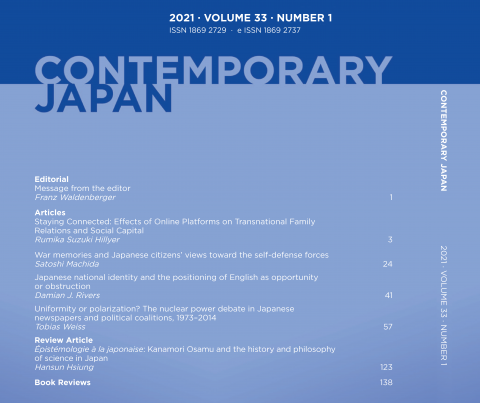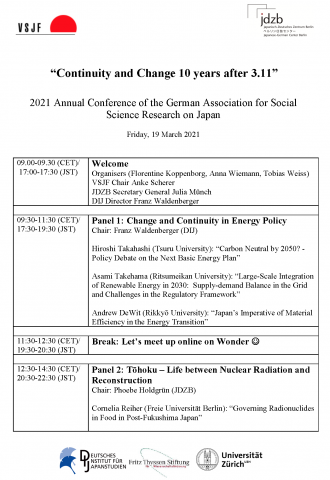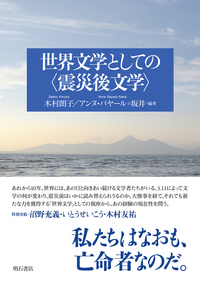Events and Activities
Barbara Holthus quoted in international media about Tokyo Olympics

As the Olympic torch relay started this week, the Tokyo Olympics are back in the focus of international media. DIJ deputy director Barbara Holthus was interviewed and quoted by several media about the current mood in Japan towards the Olympics. For CNN International, Barbara comments on Japan’s lost opportunity to re-imagine itself and get an economic boost from Olympia-related tourism. In the New York Times, Barbara explains how the 110,000 volunteers are being prepared for their roles at the Games during the pandemic. In Austrian TV’s ORF Sport am Sonntag, she comments on the exploding costs and the likelihood of the Olympics going ahead as scheduled. For an AP News article, Barbara contextualizes the recent scandals over sexist comments. In Deutsche Welle, she explains why the decision to exclude foreign spectators is a concession to the Japanese people who have become increasingly skeptical of the Olympics. For more information on research related to the Olympics, see the DIJ’s special project on the Tokyo Olympics and the open access book publication Japan Through the Lens of the Tokyo Olympics.
Book exhibition ’10 Years after 3.11′ in March and April

Ten years have passed since the massive Great East Japan Earthquake hit Japan on March 11, 2011. To mark the anniversary, the International House of Japan Library, the library of the German Institute for Japanese Studies, and the Bibliothèque de la Maison franco-japonaise present publications related to the earthquake and its aftermath in English, German, and French. The joint book exhibition is open to the public from March 1 to March 31. The exhibition at the DIJ will be open until April 30. For further information please see the poster and contact the respective library. A list of available books and articles at the DIJ library is available here for download (PDF).
DIJ researchers at virtual AAS 2021 Annual Conference

DIJ social scientists Sonja Ganseforth and Nora Kottmann have presented papers on their current research projects at this year’s virtual AAS annual conference. Sonja’s paper “The Political Ecology of Japanese Coastal Fisheries Reform” draws on her research project Fishing communities between growth and demise and studies challenges faced by Japanese coastal fisheries after recent legal reforms. Nora gave her paper “Negotiating Belonging: German Expatriates in Southern Tokyo” in the panel ‘Managing Migration in Japan: Short-term Labour, Tourists, and International Students’. Her paper is based on ongoing fieldwork and analyzes different conceptions of belonging among privileged, highly mobile short-term migrants. DIJ alumna Gabriele Vogt served as discussant in this panel. The AAS presentations are available as on-demand videos. More information here.
New article by Markus Heckel on Japan’s fiscal policy

DIJ economist Markus Heckel has contributed an article on Japan’s monetary and fiscal policy to the latest issue of Japanmarkt, the German-language quarterly published by the German Chamber of Commerce and Industry (AHK) in Japan. The Corona pandemic has caused a global economic standstill and also the Japanese economy has weakened since the beginning of the crisis. The Japanese government and central bank have therefore launched huge economic stimulus and aid programmes. In “Japans Geld- und Fiskalpolitik im Spiegel der Corona-Pandemie” (Japan’s Monetary and Fiscal Policy in the Light of the Corona Pandemic), Markus explains how the Bank of Japan and the Japanese government have coordinated their monetary and fiscal policies. He also analyzes risks and side effects of Japan’s debt problems and its ultra-loose monetary policy. The full article is available for download here. It draws on Markus’ ongoing research project Economic Discourses of Monetary Policy – The Case of the Bank of Japan.
New issue 33(1) of Contemporary Japan published

The latest issue of Contemporary Japan is now available online and in print. Articles in CJ 33(1) cover Nikkei Brazilian migrants in Japan and their use of online platforms to stay connected (by Rumika Suzuki Hillyer), war memories and Japanese citizens’ views toward the self-defense forces (by Satoshi Machida), English language education and national identity (by Damian J. Rivers), and the nuclear power debate in Japanese newspapers, 1973–2014 (by Tobias Weiss). This issue also features a Review Article of Kanamori Osamu (金森修) and the history and philosophy of science in Japan by Hansun Hsiung. Plus: three reviews of recently published books on the Soka Gakkai, the anime boom in the United States, and professional baseball in modern Japan. Please see the full issue here
VSJF Annual Conference ‘Continuity and Change 10 years after 3.11’
 The DIJ is cooperation partner of the 2021 Annual Conference of the German Association for Social Science Research on Japan (VSJF), organized by DIJ alumni Anna Wiemann and Tobias Weiss together with Florentine Koppenborg. The one-day online conference ‘Continuity and Change 10 years after 3.11’ takes place on Friday, 19 March 17-25h (JST)/9-17h (CET). It features panels on ‘Change and Continuity in Energy Policy’, ‘Tōhoku – Life between Nuclear Radiation and Reconstruction’, and ‘Civil Society and the State since 3.11’. Participants include the DIJ’s director Franz Waldenberger, principal researcher Isaac Gagné, and DIJ alumna Phoebe Holdgrün. Isaac will present the paper “Haunting Memories of 3.11 and the Heaviness of Trauma in Post-Disaster Miyagi” which is part of his ongoing research project Listening to the Community: Grassroots Mental Healthcare in Local Communities. The conference is organized by the Japanese-German Center Berlin (JDZB) and the VSJF, in cooperation with the DIJ and supported by the Fritz Thyssen Stiftung and the Universität Zürich. Details, programme, and registration link here.
The DIJ is cooperation partner of the 2021 Annual Conference of the German Association for Social Science Research on Japan (VSJF), organized by DIJ alumni Anna Wiemann and Tobias Weiss together with Florentine Koppenborg. The one-day online conference ‘Continuity and Change 10 years after 3.11’ takes place on Friday, 19 March 17-25h (JST)/9-17h (CET). It features panels on ‘Change and Continuity in Energy Policy’, ‘Tōhoku – Life between Nuclear Radiation and Reconstruction’, and ‘Civil Society and the State since 3.11’. Participants include the DIJ’s director Franz Waldenberger, principal researcher Isaac Gagné, and DIJ alumna Phoebe Holdgrün. Isaac will present the paper “Haunting Memories of 3.11 and the Heaviness of Trauma in Post-Disaster Miyagi” which is part of his ongoing research project Listening to the Community: Grassroots Mental Healthcare in Local Communities. The conference is organized by the Japanese-German Center Berlin (JDZB) and the VSJF, in cooperation with the DIJ and supported by the Fritz Thyssen Stiftung and the Universität Zürich. Details, programme, and registration link here.
New DIJ Miscellanea Double Debt Disaster
 Double Debt Disaster by Julius Weitzdörfer and S.J. Beard is latest volume published in our DIJ Miscellanea series. It offers a detailed examination of obstacles to recovery from catastrophes caused by the concurrence of pre-disaster obligations with post-disaster capital needs and the destruction of collateral assets. The convergence of growing risk from natural hazards, coupled with ever-higher levels of public and private indebtedness will soon propel the quest for micro-and macro-economic policy solutions to global attention. No case is more instructive for understanding these problems than the Great East Japan Earthquake. In its wake came a second disaster, as former home-owners and businesspeople found themselves in need of loans to rebuild and invest, while being unable to pay off pre-disaster debts. Treating issues of property-, insurance-, debtor-creditor-, social welfare-, charity-, financial-, and insolvency law, this volume examines Japan’s double debt disaster from the perspective of social justice and disaster recovery. It proposes that policymakers take sustainable steps to avoid socioeconomic disasters. More details and link to download the PDF here.
Double Debt Disaster by Julius Weitzdörfer and S.J. Beard is latest volume published in our DIJ Miscellanea series. It offers a detailed examination of obstacles to recovery from catastrophes caused by the concurrence of pre-disaster obligations with post-disaster capital needs and the destruction of collateral assets. The convergence of growing risk from natural hazards, coupled with ever-higher levels of public and private indebtedness will soon propel the quest for micro-and macro-economic policy solutions to global attention. No case is more instructive for understanding these problems than the Great East Japan Earthquake. In its wake came a second disaster, as former home-owners and businesspeople found themselves in need of loans to rebuild and invest, while being unable to pay off pre-disaster debts. Treating issues of property-, insurance-, debtor-creditor-, social welfare-, charity-, financial-, and insolvency law, this volume examines Japan’s double debt disaster from the perspective of social justice and disaster recovery. It proposes that policymakers take sustainable steps to avoid socioeconomic disasters. More details and link to download the PDF here.
New book chapter by Barbara Geilhorn on post-3.11 plays

DIJ research fellow Barbara Geilhorn has contributed the chapter “Genjitsu wo henyō saseru fikushon. Okada Toshiki no engeki kara kore kara no nihon shakai wo yomitoku” (Fiction that transforms reality: understanding the future of Japanese society through the plays of Toshiki Okada) to a new book publication on post-3.11 literature. Barbara’s chapter in Sekai bungaku toshite no ‘shinsaigo bungaku’ (‘Post-disaster literature’ as world literature) discloses the political potentialities of theatrical space through an in-depth evaluation of two post-‘Fukushima’ plays by Okada Toshiki, who gained reputation for his socially engaged theatre. While Unable to See (2012) is a harsh satire, written for a foreign audience, Current Location (Genzaichi, 2012) addresses the fear of nuclear threat from the perspective of Tokyo inhabitants as science fiction. The chapter scrutinizes the significance of Okada’s recent concept of fiction as ‘recessive reality’ and argues for a major turning point in his work as triggered by the catastrophe. Barbara’s chapter is a result of her ongoing research project Local Issues Take Stage – Culture and Community Revitalization.





 Open Access
Open Access
